
Case records and interviews with more than 50 former Liberty University students & staffers show how school discouraged, dismissed, and even blamed, students who have tried to come forward with claims of sexual assault.
(THREAD)
propublica.org/article/the-li…
(THREAD)
propublica.org/article/the-li…
In 2017, Elizabeth Axley was only a few months into her first year at Liberty when says she was raped at an off-campus Halloween party. 

She immediately alerted campus police about the alleged assault and an officer took Liz to the hospital where a nurse documented 15 bruises, welts, and lacerations on her arm, face and torso. 

Liz was confident the school would do the right thing if she told them about the alleged assault.
After all, Liberty invoked Proverbs 31:8 to encourage students to report abuse. “Speak up for those who can’t speak up for themselves for the rights of all who need an advocate.”
After all, Liberty invoked Proverbs 31:8 to encourage students to report abuse. “Speak up for those who can’t speak up for themselves for the rights of all who need an advocate.”
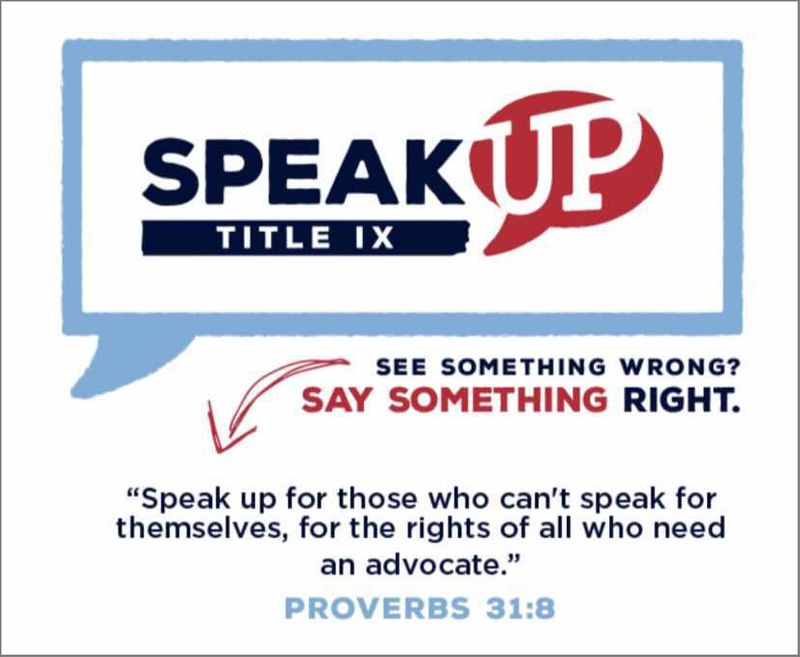
But the next morning, Liz recalls her RA advising her to not report the allegations, saying she could be found to have violated the school’s prohibition against drinking and fraternizing with the opposite sex.
Instead, the RA offered to pray with her.
Instead, the RA offered to pray with her.
Confused but undeterred, Liz went the following day to Liberty's federally mandated office for investigating sexual harassment and violence.
“I didn’t want to get fined or punished, but I wasn’t going to let this keep me from reporting my assault.”
“I didn’t want to get fined or punished, but I wasn’t going to let this keep me from reporting my assault.”
Liz went in with evidence, including texts from a friend who'd been at the party & witnessed the assailant's earlier behavior, and photos of her injuries, including welts across her chest, multiple lacerations on her upper arm & bruised lip.
(Warning: Graphic images)



(Warning: Graphic images)
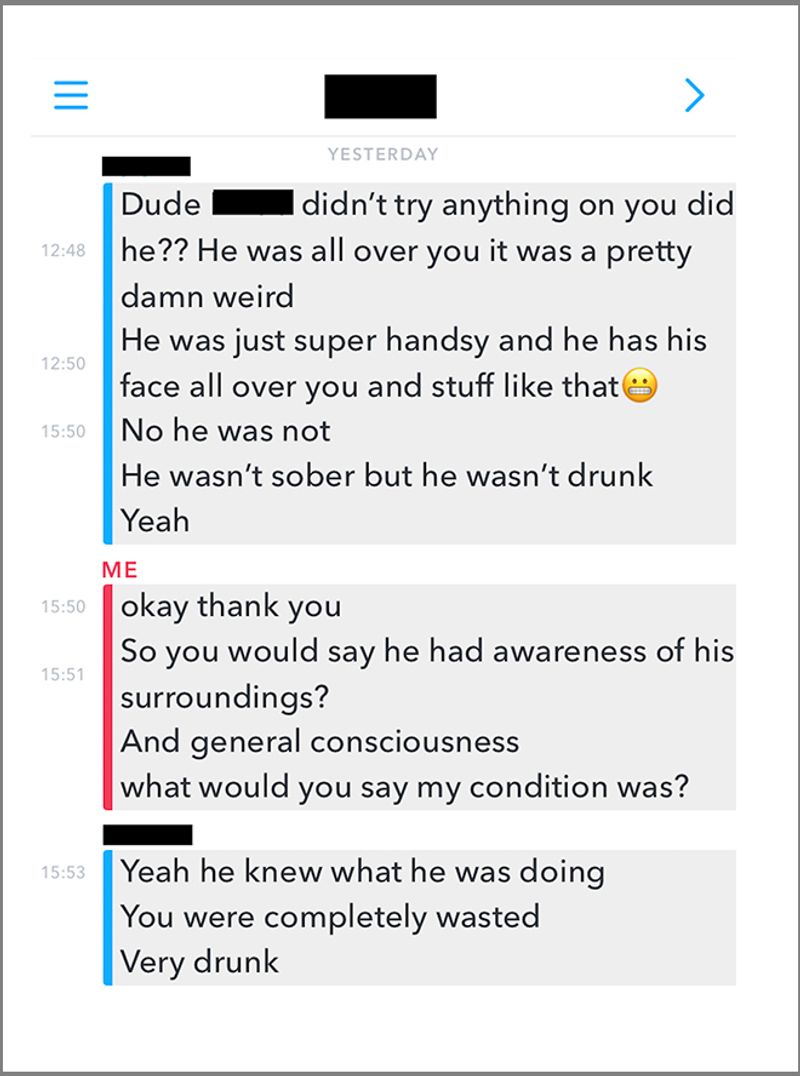
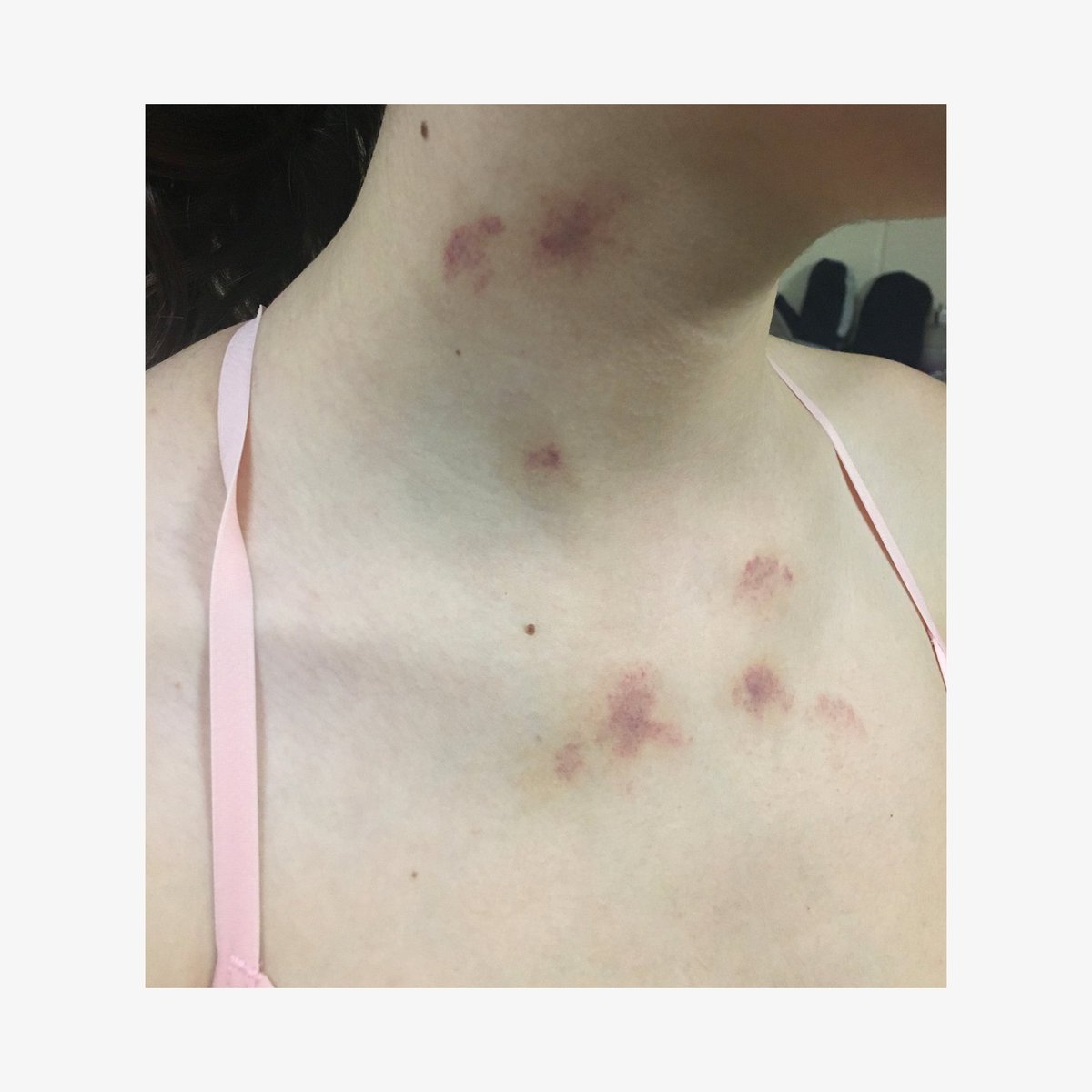
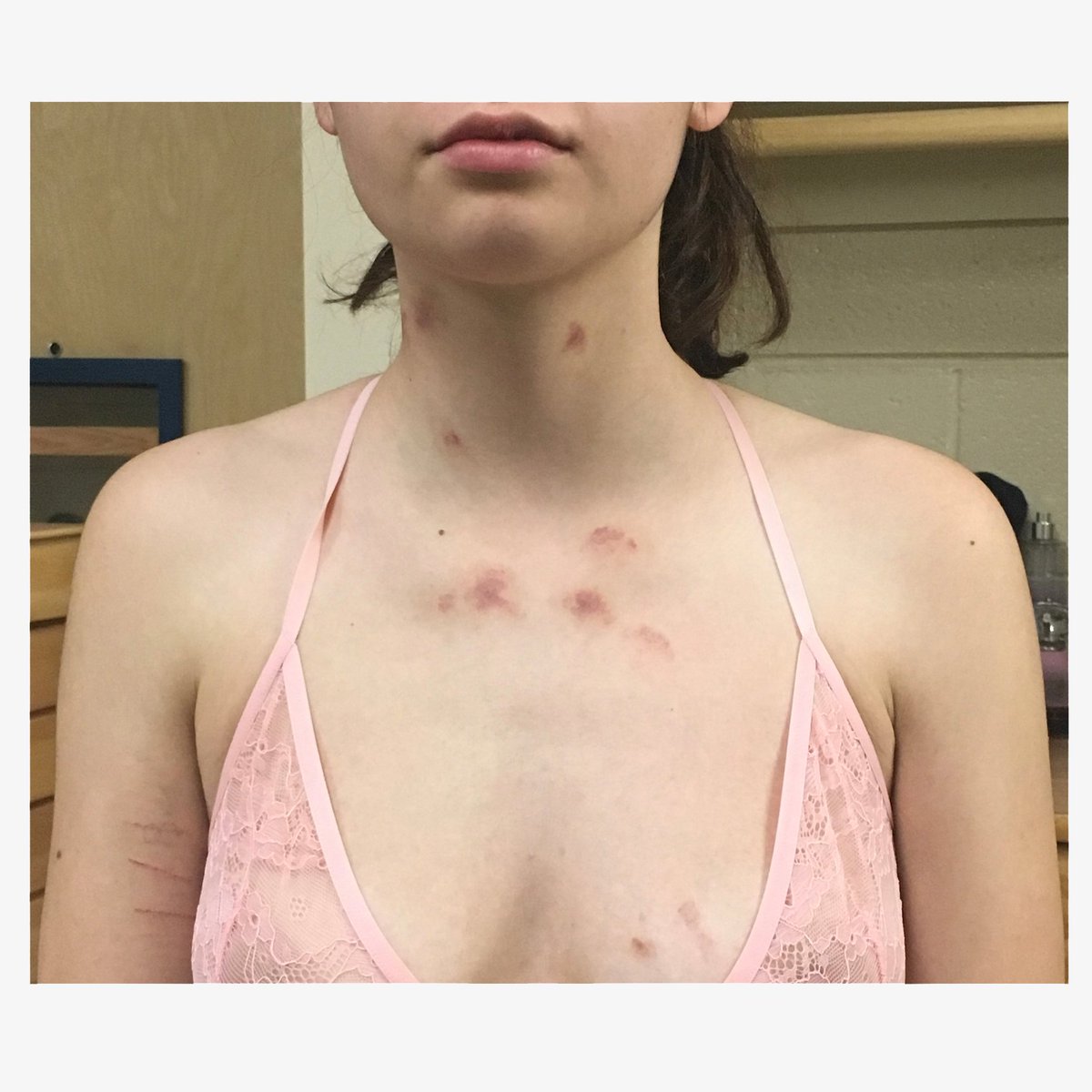
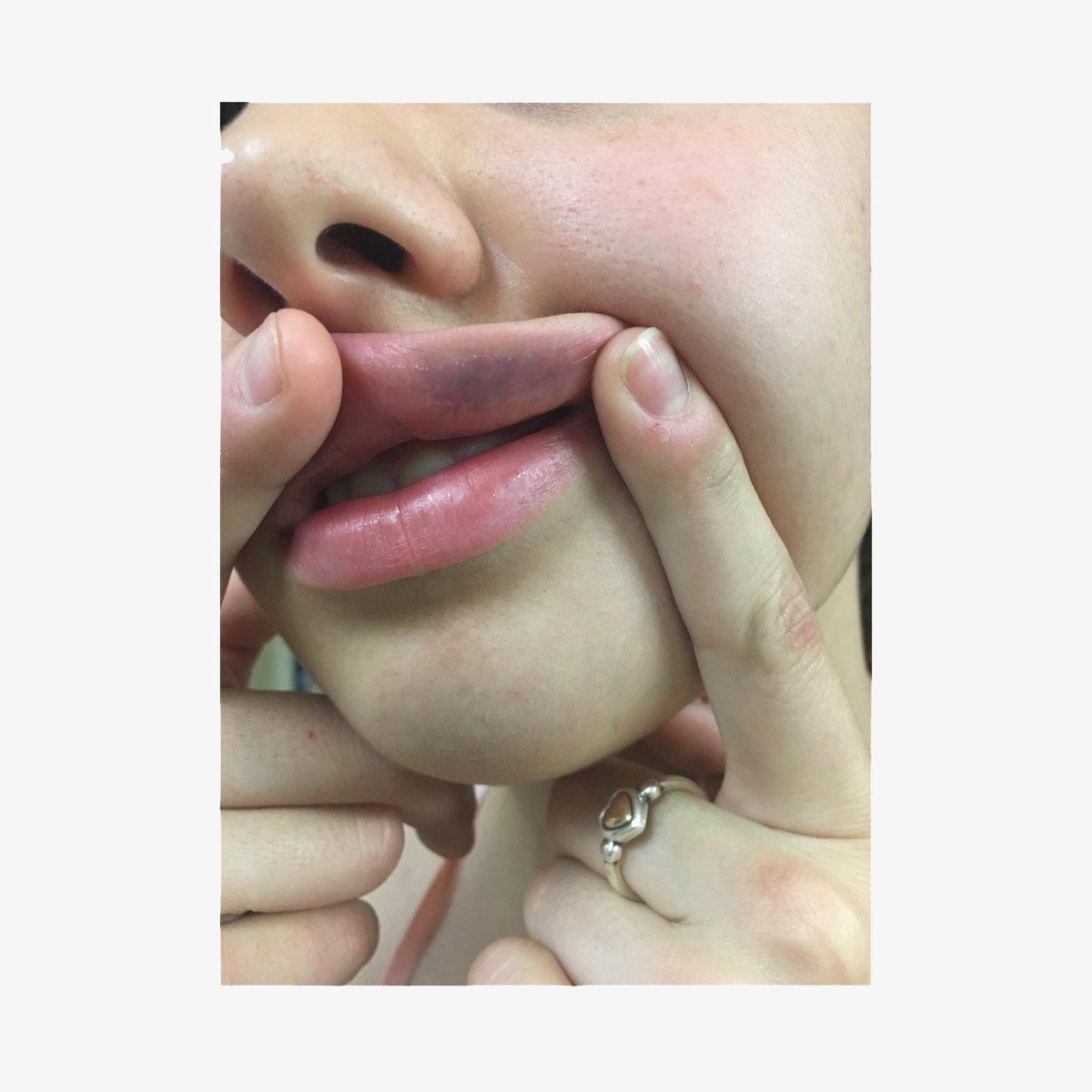
But Elysa Bucci, the Title IX investigator who took the complaint, wasn’t interested, says Liz.
Instead of considering this evidence, she said, Bucci questioned her:
Why had she gone to the party? What had she drunk? How much?
Instead of considering this evidence, she said, Bucci questioned her:
Why had she gone to the party? What had she drunk? How much?
“I immediately felt judged,” remembers Liz.
(Bucci declined to reply to requests for comment on this story.)
(Bucci declined to reply to requests for comment on this story.)
Liz returned 5 months later, after the school completed its investigation, only to find that the photos of her bruises were no longer in the file.
Bucci told her the photos had been removed because they were too “explicit.”
Bucci told her the photos had been removed because they were too “explicit.”
“I felt like I’d been punched in the stomach,” said Liz. “I had been relying on them all these months to take my evidence into account when considering my case, and it wasn’t even in my file.”
She then got an email saying she had to sign a document acknowledging that, if she moved ahead with the complaint, she could be found to have violated Liberty's code of conduct, which includes bans on drinking & “being in any state of undress with a member of the opposite sex.” 
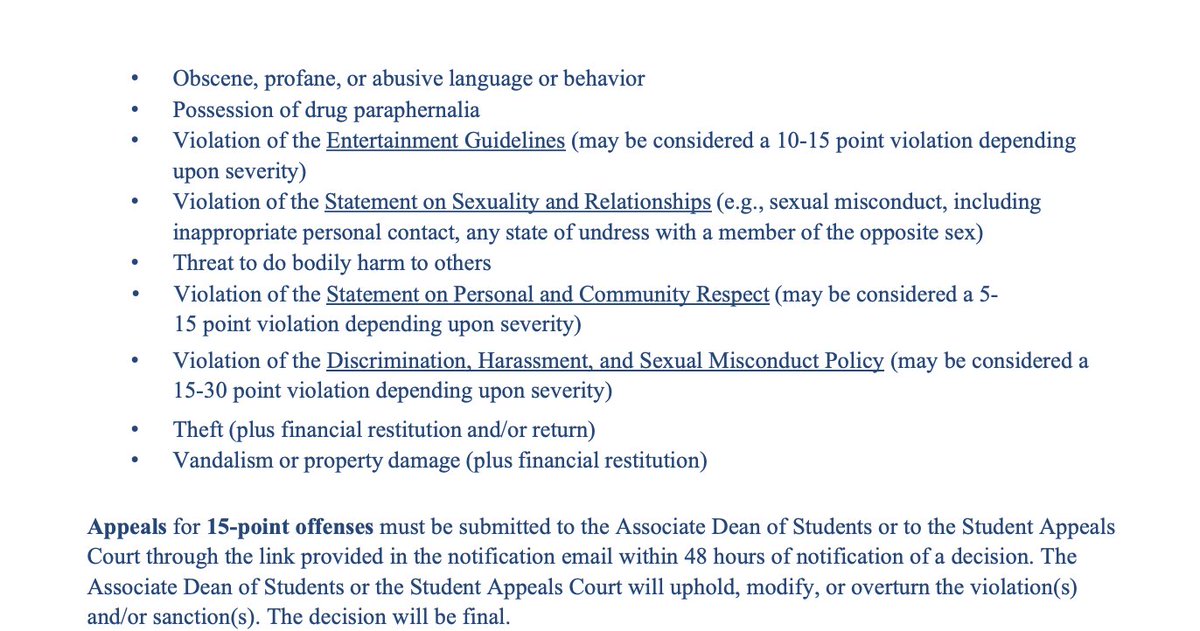
Liz resubmitted her photo evidence but soon received an email saying the committee reviewing her case had reached a decision:
By a “preponderance of the evidence,” her alleged assailant was found “not responsible” for rape.
By a “preponderance of the evidence,” her alleged assailant was found “not responsible” for rape.
The committee, which she recalls was mostly men, focused on a witness who recalled that Liz was on top of the man she said assaulted her, and that the man had told her to get off.
But that student told @ProPublica the Title IX office misrepresented her testimony.
Another witness told the same.
Another witness told the same.
The former student Liz accused of assaulting her subsequently sued her for defamation. A non-monetary settlement was reached months later.
"I didn't rape her," he said when asked about the matter.
"I didn't rape her," he said when asked about the matter.
Liz is one of three Liberty students we talked to who recalled being made to sign forms acknowledging possible violations of the Liberty Way after they sought to file complaints about sexual assault.
Diane Stargel told a Liberty mental health counselor in 2013 that she'd been raped at an off-campus party. The counselor asked her to sign a “Victim’s Notice” that warned she could be found to have broken the Liberty Way if she chose to move forward with the claims. 
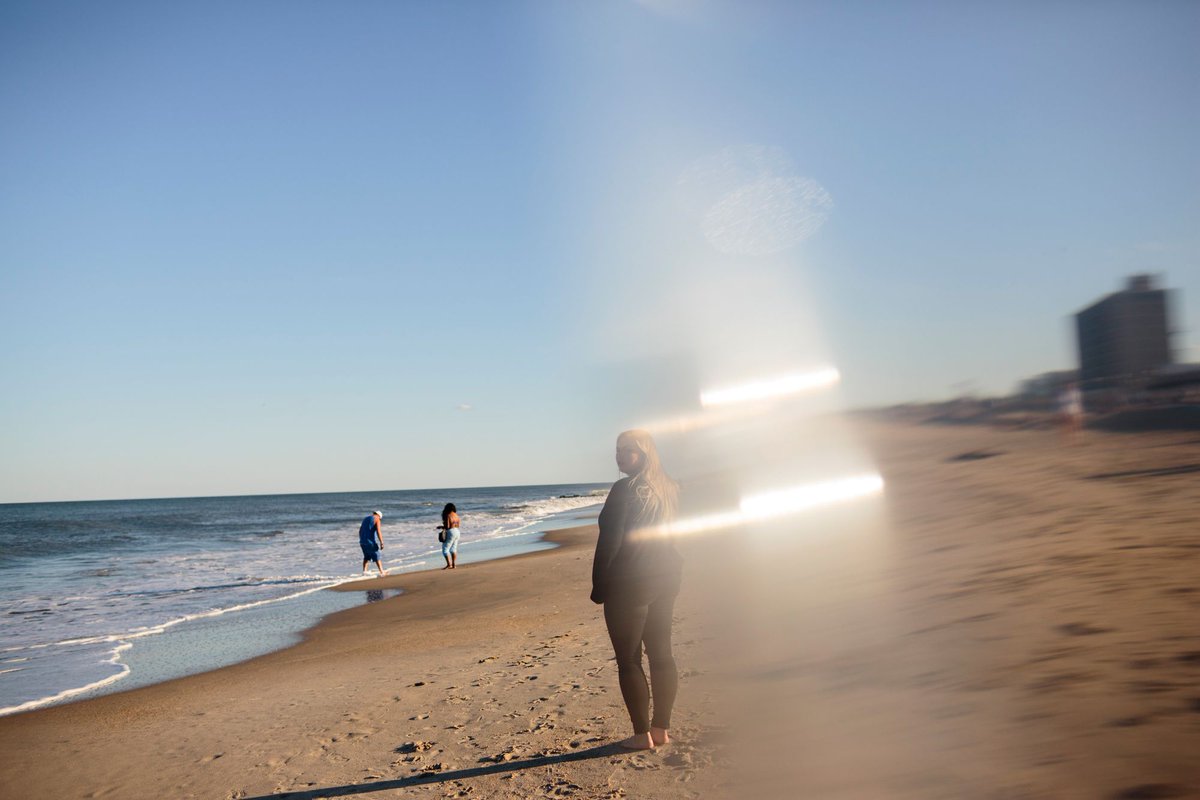
Terrified of losing her scholarship, Diane signed the paper and did not formally report being assaulted.
“I feel like Liberty bullied me into silence after what happened to me,” she said. “I’ve always regretted that I never got my day in court."
“I feel like Liberty bullied me into silence after what happened to me,” she said. “I’ve always regretted that I never got my day in court."
When Amanda Stevens reported her rape to Liberty's Title IX office in 2015, she says a school official listed her potential infractions: drinking (though she had not been drinking at the time of the assault), having premarital sex and being alone with a man on campus.
“I remember thinking, ‘What? Are you kidding me?’” said Amanda. “I could get in trouble for coming forward and reporting?”
After an investigation, Amanda recalled receiving a letter saying the student she had reported for assault had been found “not responsible.”
While Liz, Diane and Amanda were ultimately never fined by the school, other former students recalled being punished after they reported being sexually assaulted.
One said that after she reported being raped to school authorities, she was fined $500 for drinking alcohol and told she had to attend counseling. The former student, who declined to be named, said she was told her transcript would not be released until she paid.
Another student, who'd told the Title IX office about Elizabeth being mistreated at the Halloween party, was kicked out of school months later for allegedly violating the Liberty Way for drinking.
10 other former students said they chose not to report their rapes to campus officials amid fear of being punished.
“I knew I would face the blame for putting myself in that situation,” said Chelsea Andrews, a Liberty alum who said she was assaulted by a graduate student.
“I knew I would face the blame for putting myself in that situation,” said Chelsea Andrews, a Liberty alum who said she was assaulted by a graduate student.
Liberty never replied to ProPublica's detailed questions for this report.
But we did eventually hear from the school official who'd been receiving those messages: Scott Lamb, who was Liberty's SVP of communications until Oct. 6, when he said he was fired for raising concerns
But we did eventually hear from the school official who'd been receiving those messages: Scott Lamb, who was Liberty's SVP of communications until Oct. 6, when he said he was fired for raising concerns
“The emails from ProPublica were definitely ignored,” said Lamb.
When ProPublica began reporting this story, Lamb said he and a colleague tried to make a case for the school to respond.
He recalled, “We said, ‘Listen, the optics of this are killing us. Is there anything we can message —- something? A message about empathy? Or that we’re at least working to get to the bottom of this.’ And then it dawned on us: They’re not working to get to the bottom of this.”
As Lamb watched tensions on campus and beyond deepen, he says he encouraged university higher-ups to at least acknowledge the problem.
Instead, he said Liberty decided to do what it could to silence the criticism.
Instead, he said Liberty decided to do what it could to silence the criticism.
A Sept. 22 email from the school’s marketing department to top Liberty officials, including the school’s president, briefed them on the “uptick” in “people commenting about the sexual assault cases at Liberty” on the school’s various social media platforms. 
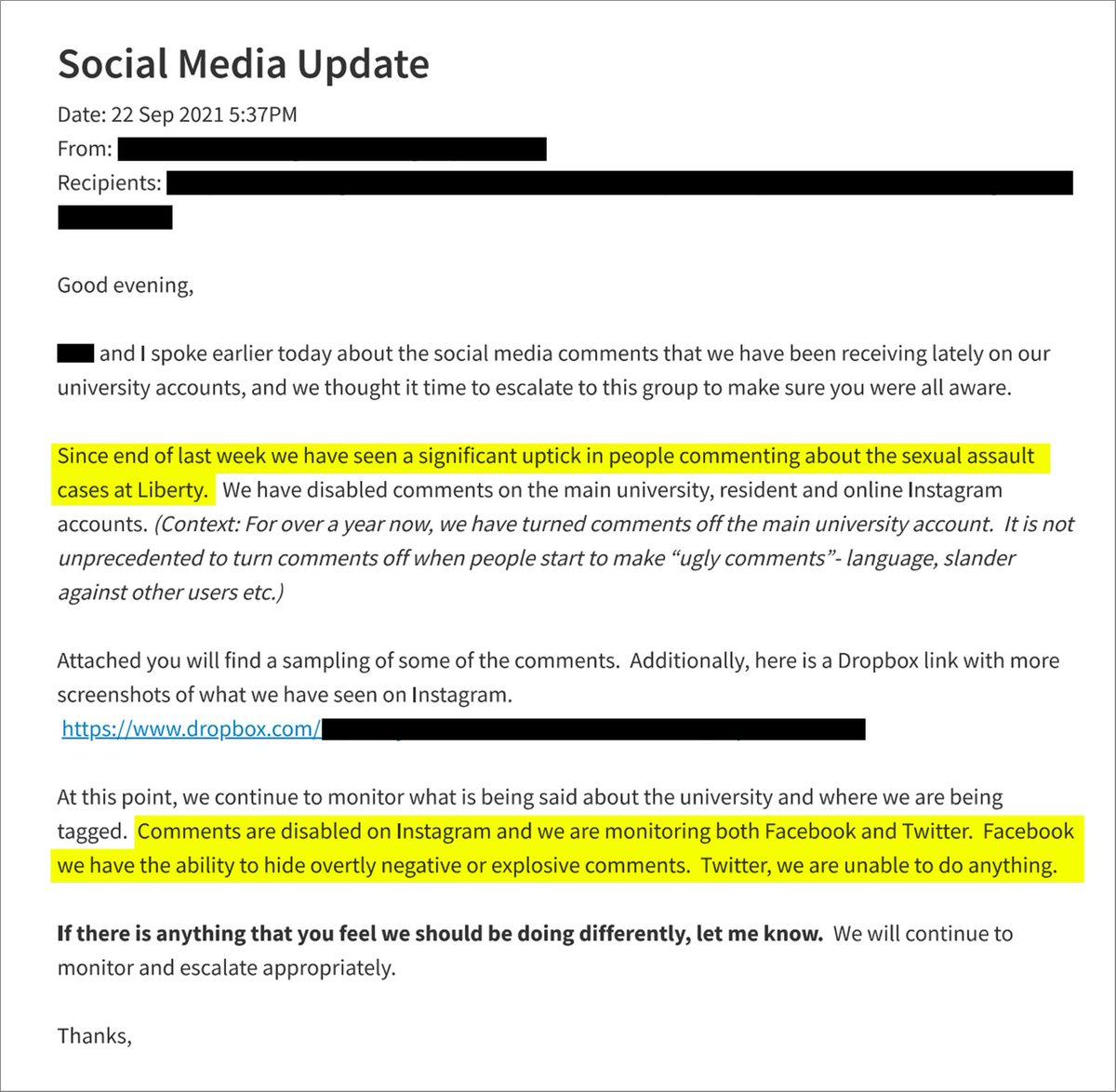
“We have disabled comments on the main university, resident & online Instagram accounts,” the marketing exec wrote. “Comments are disabled on Instagram & we are monitoring both Facebook & Twitter. On Facebook we have the ability to hide overly negative or explosive comments."
“The problem isn’t the PR; — the problem is the problem,” said Lamb.
If you have information about Liberty University that we should know about, please contact hannah.dreyfus@propublica.org or 917-727-5332
• • •
Missing some Tweet in this thread? You can try to
force a refresh




